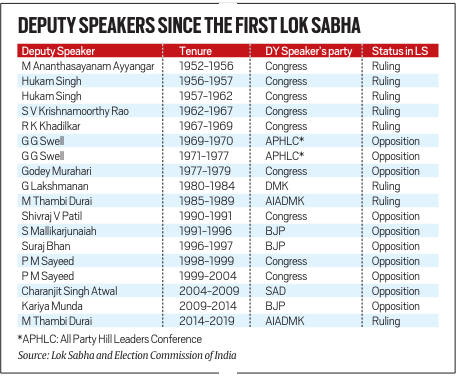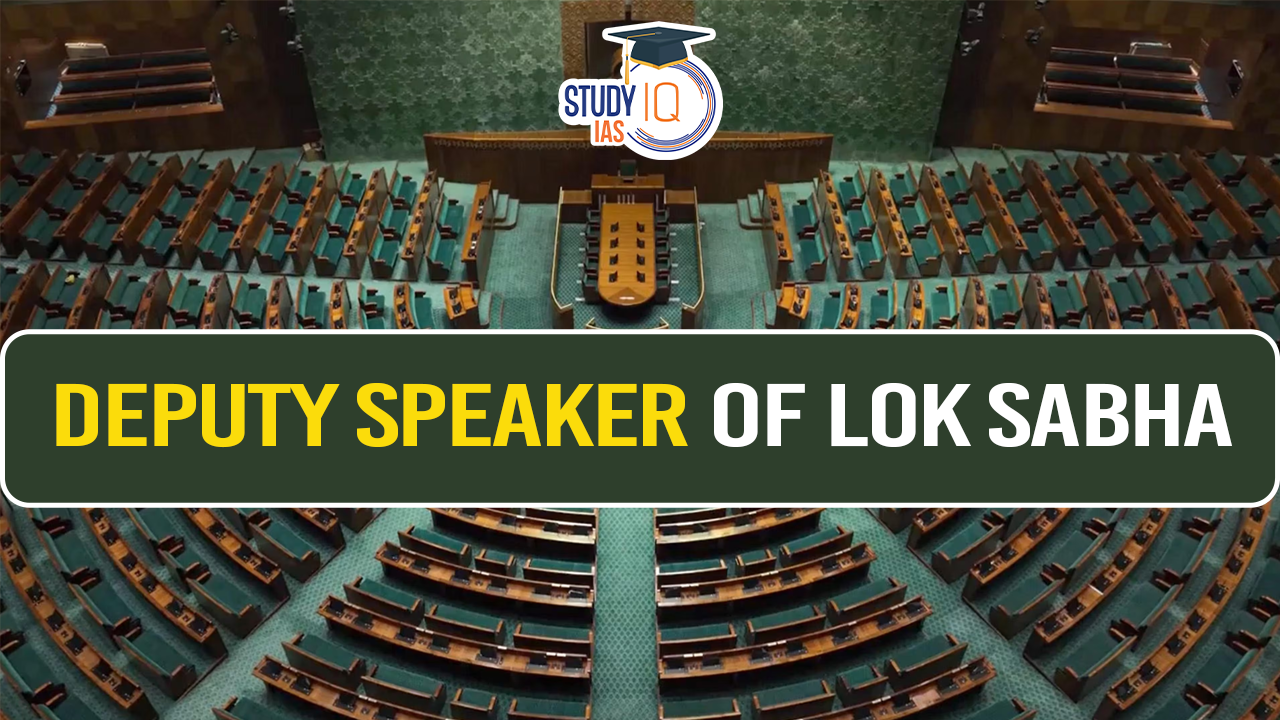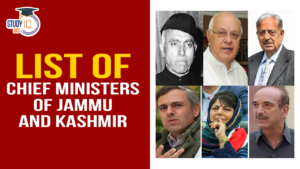Table of Contents
Context: Congress MP Rahul Gandhi and the Opposition have shown a willingness to support the NDA’s candidate for Speaker, on the condition that the government follows parliamentary convention by allocating the Deputy Speaker’s post to the Opposition.
Deputy Speaker of Lok Sabha
Deputy Speaker of the Lok Sabha is a key parliamentary position in India. The Lok Sabha is the lower house of India’s bicameral Parliament. The Deputy Speaker is elected by the members of the Lok Sabha from among themselves. The primary role of the Deputy Speaker is to preside over the sessions of the Lok Sabha in the absence of the Speaker. They also assist the Speaker in the discharge of their duties.

Constitutional Provisions for Deputy Speaker
- Article 93: It says that the House of the People shall, as soon as may be, choose two members to be the Speaker and Deputy Speaker and, so often as the office of Speaker or Deputy Speaker becomes vacant, the House shall choose another member.
- Article 178: It contains the corresponding position for Speaker and Deputy Speaker of the Legislative Assembly of a State.
- Article 94: Article 94 provides for vacation/resignation/removal of the Speaker or Deputy Speaker of the House of the People.
- Under it, the Speaker or Deputy Speaker shall vacate his office if he ceases to be a member of the House.
- They may also resign to each other or may be removed from office by a resolution of the House of the People passed by a majority of all the then members of the House.
- Article 179 provides similar provisions for State Assemblies.
Rules for Election of Deputy Speaker
- Mandatory Election: Both Articles 93 and 178 use the word “shall”, indicating that the election of Speaker and Deputy Speaker is mandatory under the Constitution.
- Time Frame: There is no specific time frame mentioned in the Constitution for the election of Speaker and Deputy Speaker. All that the Constitution says is the election must be held as soon as possible.
- Tenure: Once elected, the Deputy Speaker usually continues in office for the entire duration of the House.
- Convention: The practice in both Lok Sabha and the State Assemblies has been to elect the Speaker during the first session of the new House.
- The election of the Deputy Speaker usually takes place in the second session.
- It is generally not delayed further in the absence of genuine and unavoidable constraints.
- It has been usual practice to offer the post of Deputy Speaker to the Opposition (since 10th Lok Sabha).
- The election of the Deputy Speaker usually takes place in the second session.
- Rule 8: Rule 8 of The Rules of Procedure and Conduct in Lok Sabha says that the election of Deputy Speaker shall be held on such date as the Speaker may fix.
- The Deputy Speaker is elected once a motion proposing his name is carried in the House.
- Vacant Post: The House is informed of the resignation of the Speaker by the Deputy Speaker and if the office of the Deputy Speaker is vacant, by the Secretary-General who receives the letter of resignation in that House.
- Dr BR Ambedkar had stressed in the Constituent Assembly that the Speaker and the Deputy Speaker must tender their resignations to the House which is the appointing authority.
- Consequently, the provision was made that the resignation should be addressed either to the Speaker or to the Deputy Speaker because it is they who represent the House.
- When the Offices of both the Speaker and the Deputy Speaker fall vacant, the duties of the Office of the Speaker are performed by such Member of the Lok Sabha as the President may appoint for the purpose.
- The person so appointed is known as the Speaker pro tem.
- Dr BR Ambedkar had stressed in the Constituent Assembly that the Speaker and the Deputy Speaker must tender their resignations to the House which is the appointing authority.
- Deputy Speaker’s Role in Absence of Speaker: The Deputy Speaker has historically filled in for the Speaker during vacancies.
- Examples:
- After Speaker G V Mavalankar’s death in 1956, Deputy Speaker M Ananthasayanam Ayyangar assumed the role until the end of the Lok Sabha’s term.
- After Speaker GMC Balayogi’s death in 2002, Deputy Speaker P M Sayeed served as acting Speaker until a new Speaker was elected.
- Examples:
Powers and Functions of Deputy Speaker
- Article 95(1): According to it, while the office of Speaker is vacant, the duties of the office shall be performed by the Deputy Speaker.
- Same Powers as Speaker: In general, the Deputy Speaker has the same powers as the Speaker when presiding over a sitting of the House.
- All references to the Speaker in the Rules are deemed to be references to the Deputy Speaker when he presides.
- The Speaker and the Deputy Speaker are the Presiding Officers of the Lok Sabha.
- Independent of Speaker: The Deputy Speaker is independent of the Speaker, not subordinate to him, as both are elected from among the members of the House.
- Appeal: It has been held that no appeal lies to the Speaker against a ruling given by the Deputy Speaker or any person presiding over the House in the absence of the Speaker.
- Stature: Since Independence, the Lok Sabha Deputy Speaker’s position has grown in importance. The Deputy Speaker has chaired committees both inside and outside of Parliament.
- Ensures Continuity: The Deputy Speaker ensures the continuity of the Speakers office by acting as the Speaker when the office becomes vacant by death or because of resignation.
- Presides Over Proceedings: When a resolution for the removal of the Speaker is up for discussion, the Constitution specifies that the Deputy Speaker presides over the proceedings of the House.
- Special Privilege: One of his special privileges as Deputy Speaker is that when he is appointed as a member of a Parliamentary Committee, he automatically becomes its Chairman.
| Facts |
|
Opposition’s Historical Hold on Deputy Speaker Post
- Congress-led UPA Governments: The post of Deputy Speaker has frequently been held by members of the Opposition.
- During UPA-I (2004-09) and UPA-II (2009-14), the position was held by Charanjit Singh Atwal of the Shiromani Akali Dal and Kariya Munda of the BJP, respectively.
- During Atal Bihari Vajpayee’s tenure as Prime Minister (1999-2004), P M Sayeed of the Congress served as Deputy Speaker.
- Significance: This pattern underscores the Deputy Speaker’s role as a critical element of parliamentary democracy, ensuring a balance of power and representation.
Conclusion
- The election and appointment of the Deputy Speaker in Lok Sabha are vital for the functioning and balance of parliamentary proceedings.
- The Opposition’s recent push for this post, backed by constitutional provisions and historical precedence, highlights ongoing dynamics and negotiations within India’s legislative framework.


 List of Chief Ministers of Jammu and Kas...
List of Chief Ministers of Jammu and Kas...
 Cabinet Committee on Security Suspends I...
Cabinet Committee on Security Suspends I...
 Pahalgam Terror Attack: All Eyes on Paha...
Pahalgam Terror Attack: All Eyes on Paha...






















